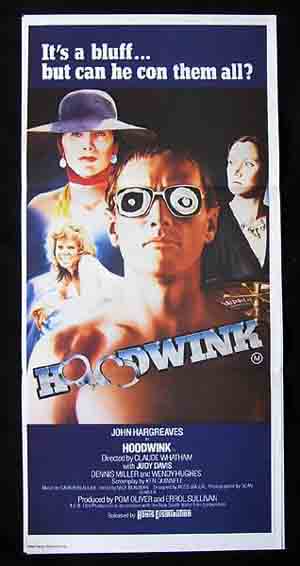
HOODWINK
Australia, 1981, 90 minutes, Colour.
John Hargreaves, Judy Davis, Dennis Miller, Max Cullen, Wendy Hughes, Kim Deacon, Michael Caton.
Directed by Claude Whatham.
Hoodwink is a bit of a con in itself - light surface, serious underneath, a mixture of fine elements with the corny and the needlessly crude. John Hargreaves does his best with an ocker hero: a dim/smart robber with a flair for escapes.
The development of his character at the end is not easy to accept. Hargreaves shines in the prison sequences (so reminiscent of Stir). Judy Davis is excellent in a supporting role, injecting great subtlety into an underwritten character of a lay preacher's prim, passionate wife. Bouncy Dennis Miller seems miscast as the preacher. Attractively glossy ( Sydney/N.S.W. look very good) for a popular audience - it has its moments, funny and serious. English director Claude Whatham directed That'll Be The Day, Swallows and Amazons.
1. The meaning of the title? Trick, confidence trick? The mod of the title the humorous side, the serious underside?
2. The Australian flavour of the film? The English director working in Australia with Australians? The Australian types, Sydney city life, prison, courts? The religious background of the lap preacher? How authentic did the story seem? Based on fact? Musical score, title song at the end?
3. Martin as an ocker hero? The dim smart hero? His lack of forethought? His innate shrewdness? The genial opening, the reunion with Lucy, the liaison with her? The arrest and his paying off the police? The background to expected police corruption? Prison and his treatment there? His visit to his parents - mother's concern, father's lack of interest? His sister and her visit to the prison, to the beach? His friends in prison and his popularity? The Australian genial underdog hero? Audience sympathy for him, liking for him? Approving of him?
4. His skill in escaping - bribes, the gun being smuggled into the prison, his parents' house (with the aftermath of his father being beaten)? His enjoying his escape - the car at the dead end, the sequence on the beach, the restaurant and seeing himself on television, picking up the prostitute, the sexual encounter, his vanity with his yoga positions?
5. His being betrayed and the return to prison? The conventional sequences of men returning to prison, prison life? The immediate impact of his blindness? Chicken's betraying him as regards the nurse and doctor as hostage - and
their hostile reaction to him? The brutal treatment? The medical tests, the tricks by the guards for his falling over? The foreign doctor? His lawyers and their advice? The judge and his attitude - and the humorous consultation with the medical expert? Martin explaining his blindness techniques to Buster? The strain on him - and the humorous irony where he tripped over the guard's bike and trampled on it?
6. The contribution of the prison characters: Buster and his friendship with Martin, interest in the blindness? Robert and his support - and the concert? Chicken and his betrayal and fear? The atmosphere of the prison sequences? The guards, bullies and those sympathetic?
7. Ralph and Sarah - seriously presented, the comic and satiric touch? The ironies of the service for the prisoners? Entertaining them at tea? Sarah and her compassion for Martin and his blindness? The decision to take him out? Martin's attraction towards her - the sequence of his feeling her face? His decision to tell her the truth? How credible was his falling in love with her after our seeing him with Lucy and the prostitute? The quality of his relationship with her, his changing? The guards and their reaction to his relationship with her? Ralph and his anger and punching Martin - and being sorry and praying? Ralph and Sarah allowing him to escape?
8. Sarah - Judy Davis' skill in presenting her as a passionate but restrained and repressed type? Her manner, walk, clothes? Her repression? Her God language? Relationship to her husband, the gap in the marriage, the children? Her response to her face being felt? Being at home with Martin? Being honest with him? The afternoon with his painting, the sexual encounter?
9. Her telling the truth to Ralph? Her decision to let Martin go? How true a character sketch of this kind of woman? The atmosphere of the family, enjoyment and tension? The comments on the Australian family? Ralph, his work, his religiosity? The three praying in the countryside? His God language? His reaction to the truth? Anger, feeling shattered?
10. Martin and his blindness - the ingenuity of his plan, the excellence of its execution, his avoiding the various traps, his explaining his technique? Reaction in court - in his defence of himself? His final escape and his good humour? His future?
11. The blend of the serious and the humorous? How satisfyingly blended?
12. Martin as an ocker hero? Ordinary man, special, serious? The ironic touch?
13. The presentation of women - Lucy and her relationship with Martin, wanting to settle down, her work? The prostitute and her ambitions, the interview, the discovery of the money, the betrayal? Martin's mother and sister and their love for him and resentment towards him?
14. The presentation of the police. authority? The cynical attitude of the police and their capacity for corruption?
15. A satisfying blend for comedy thriller? Australian style?